Principles of Health & Social Care Practice Report - HND Unit 2
VerifiedAdded on 2023/03/24
|14
|4328
|77
Report
AI Summary
This report delves into the core principles of health and social care, examining their practical application through various case studies. It explores the principles of support, emphasizing person-centered approaches and their benefits for patients like Denis, an elderly man requiring care. The report further investigates the impact of social processes such as isolation and marginalization on patients, alongside the procedures for protecting clients and colleagues from harm. Ethical dilemmas and conflicts in care provision, as illustrated by the case of Mrs. Helen, are analyzed, alongside the effectiveness of interpersonal working. Moreover, the report discusses implemented policies, legislation, regulations, and codes of practice, as well as the development of local policies and their impact on organizational practices. It also covers theories applied in health and social care practice, evaluating roles, responsibilities, and contributions to organizational policy, culminating in recommendations for good practice.
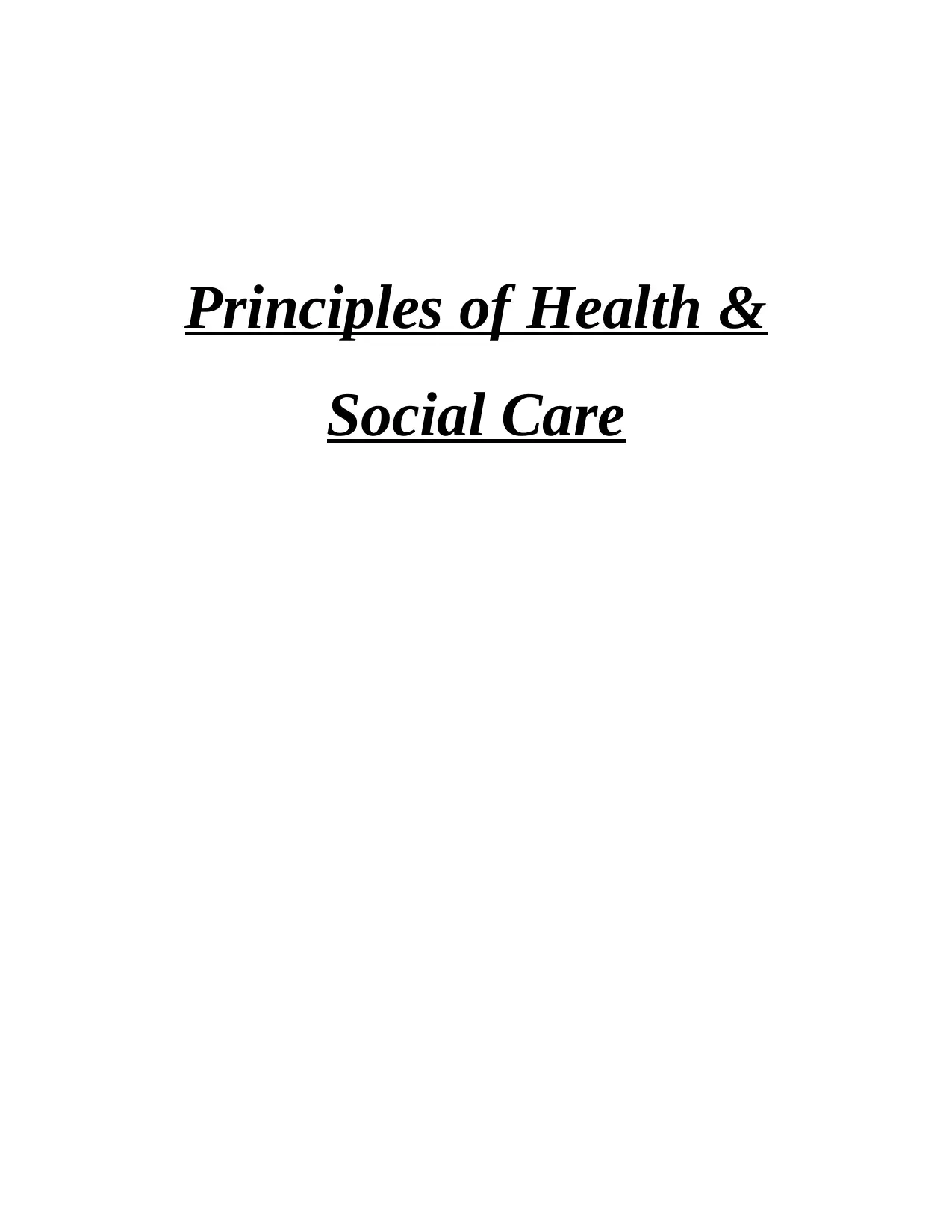
Principles of Health &
Social Care
Social Care
Paraphrase This Document
Need a fresh take? Get an instant paraphrase of this document with our AI Paraphraser

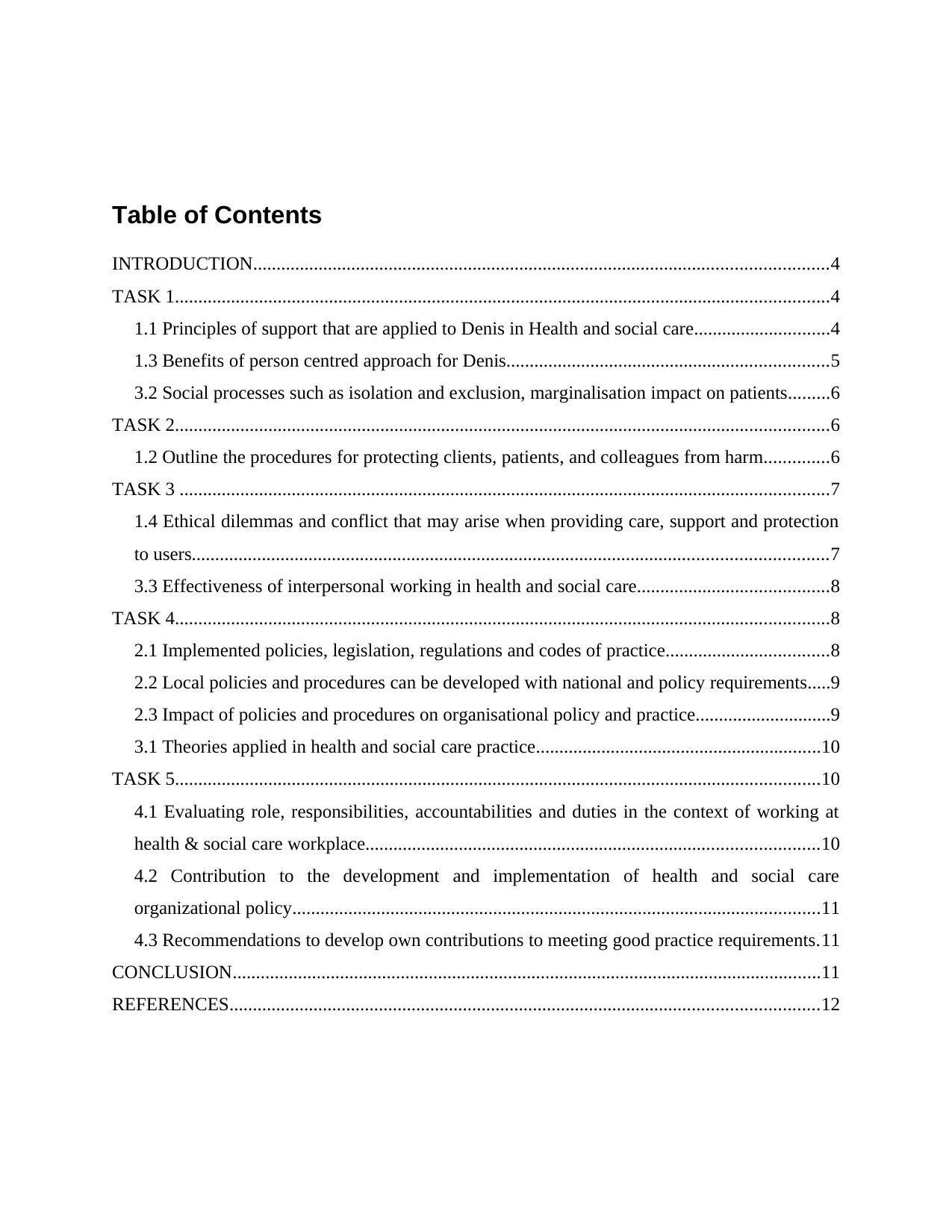
Table of Contents
INTRODUCTION...........................................................................................................................4
TASK 1............................................................................................................................................4
1.1 Principles of support that are applied to Denis in Health and social care.............................4
1.3 Benefits of person centred approach for Denis.....................................................................5
3.2 Social processes such as isolation and exclusion, marginalisation impact on patients.........6
TASK 2............................................................................................................................................6
1.2 Outline the procedures for protecting clients, patients, and colleagues from harm..............6
TASK 3 ...........................................................................................................................................7
1.4 Ethical dilemmas and conflict that may arise when providing care, support and protection
to users........................................................................................................................................7
3.3 Effectiveness of interpersonal working in health and social care.........................................8
TASK 4............................................................................................................................................8
2.1 Implemented policies, legislation, regulations and codes of practice...................................8
2.2 Local policies and procedures can be developed with national and policy requirements.....9
2.3 Impact of policies and procedures on organisational policy and practice.............................9
3.1 Theories applied in health and social care practice.............................................................10
TASK 5..........................................................................................................................................10
4.1 Evaluating role, responsibilities, accountabilities and duties in the context of working at
health & social care workplace.................................................................................................10
4.2 Contribution to the development and implementation of health and social care
organizational policy.................................................................................................................11
4.3 Recommendations to develop own contributions to meeting good practice requirements.11
CONCLUSION..............................................................................................................................11
REFERENCES..............................................................................................................................12
INTRODUCTION...........................................................................................................................4
TASK 1............................................................................................................................................4
1.1 Principles of support that are applied to Denis in Health and social care.............................4
1.3 Benefits of person centred approach for Denis.....................................................................5
3.2 Social processes such as isolation and exclusion, marginalisation impact on patients.........6
TASK 2............................................................................................................................................6
1.2 Outline the procedures for protecting clients, patients, and colleagues from harm..............6
TASK 3 ...........................................................................................................................................7
1.4 Ethical dilemmas and conflict that may arise when providing care, support and protection
to users........................................................................................................................................7
3.3 Effectiveness of interpersonal working in health and social care.........................................8
TASK 4............................................................................................................................................8
2.1 Implemented policies, legislation, regulations and codes of practice...................................8
2.2 Local policies and procedures can be developed with national and policy requirements.....9
2.3 Impact of policies and procedures on organisational policy and practice.............................9
3.1 Theories applied in health and social care practice.............................................................10
TASK 5..........................................................................................................................................10
4.1 Evaluating role, responsibilities, accountabilities and duties in the context of working at
health & social care workplace.................................................................................................10
4.2 Contribution to the development and implementation of health and social care
organizational policy.................................................................................................................11
4.3 Recommendations to develop own contributions to meeting good practice requirements.11
CONCLUSION..............................................................................................................................11
REFERENCES..............................................................................................................................12
⊘ This is a preview!⊘
Do you want full access?
Subscribe today to unlock all pages.

Trusted by 1+ million students worldwide
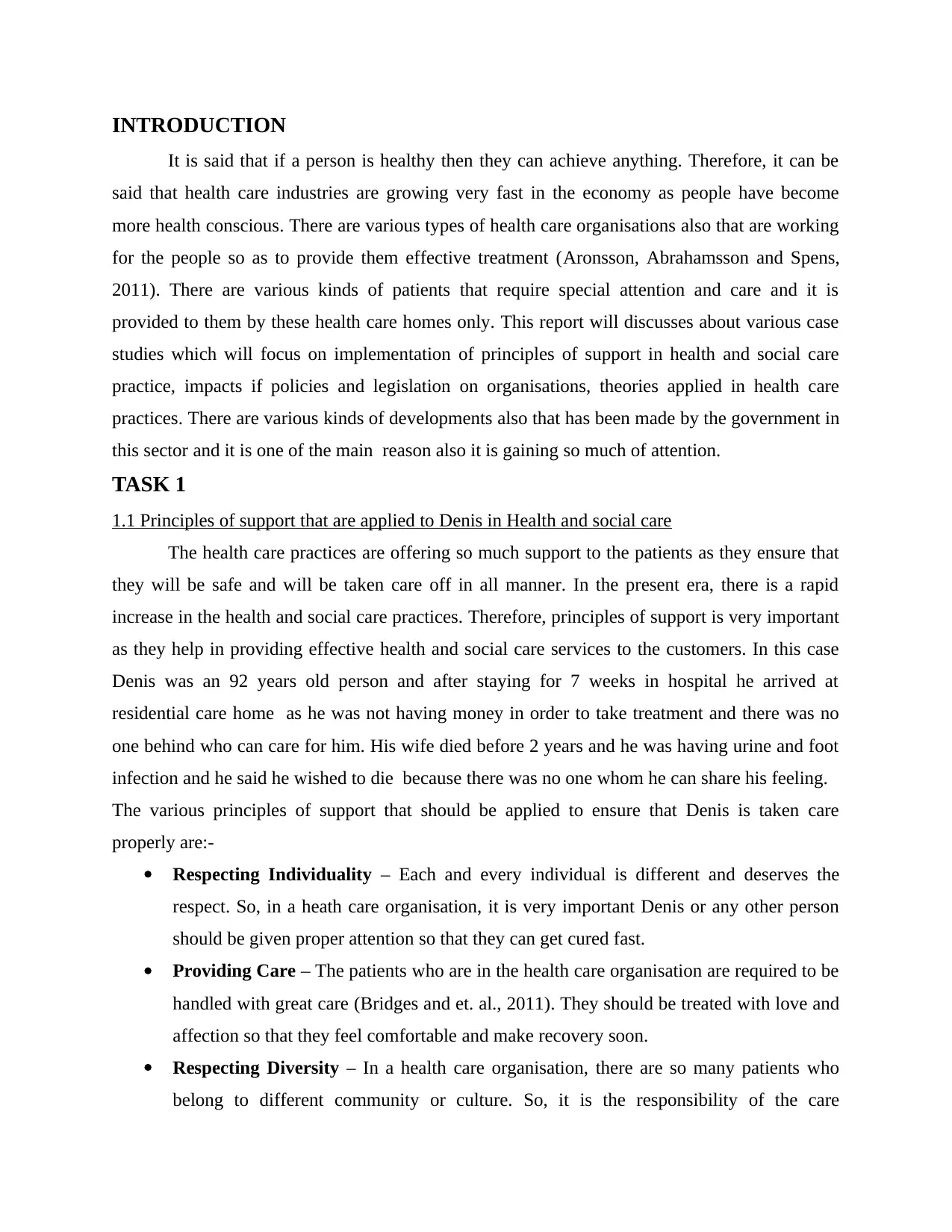
INTRODUCTION
It is said that if a person is healthy then they can achieve anything. Therefore, it can be
said that health care industries are growing very fast in the economy as people have become
more health conscious. There are various types of health care organisations also that are working
for the people so as to provide them effective treatment (Aronsson, Abrahamsson and Spens,
2011). There are various kinds of patients that require special attention and care and it is
provided to them by these health care homes only. This report will discusses about various case
studies which will focus on implementation of principles of support in health and social care
practice, impacts if policies and legislation on organisations, theories applied in health care
practices. There are various kinds of developments also that has been made by the government in
this sector and it is one of the main reason also it is gaining so much of attention.
TASK 1
1.1 Principles of support that are applied to Denis in Health and social care
The health care practices are offering so much support to the patients as they ensure that
they will be safe and will be taken care off in all manner. In the present era, there is a rapid
increase in the health and social care practices. Therefore, principles of support is very important
as they help in providing effective health and social care services to the customers. In this case
Denis was an 92 years old person and after staying for 7 weeks in hospital he arrived at
residential care home as he was not having money in order to take treatment and there was no
one behind who can care for him. His wife died before 2 years and he was having urine and foot
infection and he said he wished to die because there was no one whom he can share his feeling.
The various principles of support that should be applied to ensure that Denis is taken care
properly are:-
Respecting Individuality – Each and every individual is different and deserves the
respect. So, in a heath care organisation, it is very important Denis or any other person
should be given proper attention so that they can get cured fast.
Providing Care – The patients who are in the health care organisation are required to be
handled with great care (Bridges and et. al., 2011). They should be treated with love and
affection so that they feel comfortable and make recovery soon.
Respecting Diversity – In a health care organisation, there are so many patients who
belong to different community or culture. So, it is the responsibility of the care
It is said that if a person is healthy then they can achieve anything. Therefore, it can be
said that health care industries are growing very fast in the economy as people have become
more health conscious. There are various types of health care organisations also that are working
for the people so as to provide them effective treatment (Aronsson, Abrahamsson and Spens,
2011). There are various kinds of patients that require special attention and care and it is
provided to them by these health care homes only. This report will discusses about various case
studies which will focus on implementation of principles of support in health and social care
practice, impacts if policies and legislation on organisations, theories applied in health care
practices. There are various kinds of developments also that has been made by the government in
this sector and it is one of the main reason also it is gaining so much of attention.
TASK 1
1.1 Principles of support that are applied to Denis in Health and social care
The health care practices are offering so much support to the patients as they ensure that
they will be safe and will be taken care off in all manner. In the present era, there is a rapid
increase in the health and social care practices. Therefore, principles of support is very important
as they help in providing effective health and social care services to the customers. In this case
Denis was an 92 years old person and after staying for 7 weeks in hospital he arrived at
residential care home as he was not having money in order to take treatment and there was no
one behind who can care for him. His wife died before 2 years and he was having urine and foot
infection and he said he wished to die because there was no one whom he can share his feeling.
The various principles of support that should be applied to ensure that Denis is taken care
properly are:-
Respecting Individuality – Each and every individual is different and deserves the
respect. So, in a heath care organisation, it is very important Denis or any other person
should be given proper attention so that they can get cured fast.
Providing Care – The patients who are in the health care organisation are required to be
handled with great care (Bridges and et. al., 2011). They should be treated with love and
affection so that they feel comfortable and make recovery soon.
Respecting Diversity – In a health care organisation, there are so many patients who
belong to different community or culture. So, it is the responsibility of the care
Paraphrase This Document
Need a fresh take? Get an instant paraphrase of this document with our AI Paraphraser
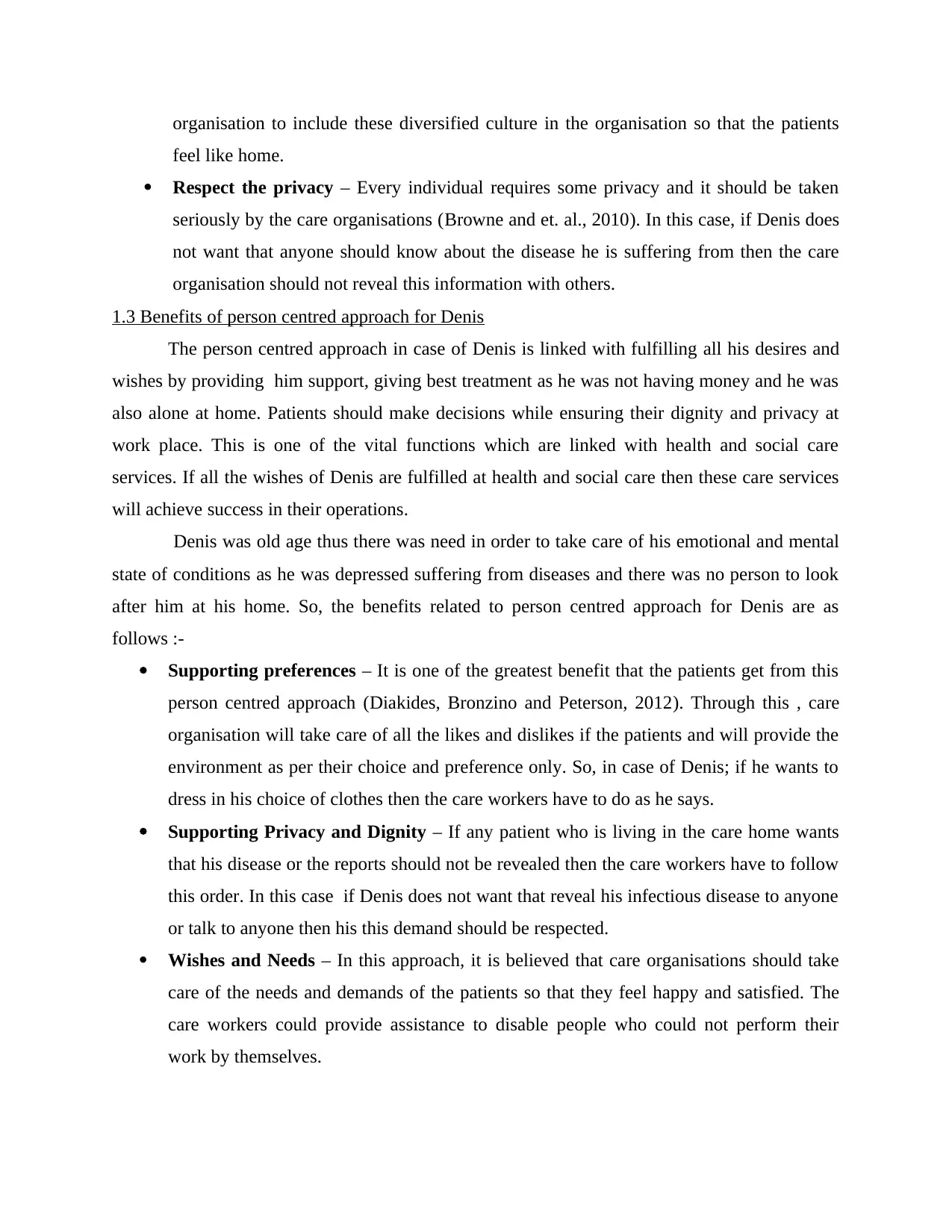
organisation to include these diversified culture in the organisation so that the patients
feel like home.
Respect the privacy – Every individual requires some privacy and it should be taken
seriously by the care organisations (Browne and et. al., 2010). In this case, if Denis does
not want that anyone should know about the disease he is suffering from then the care
organisation should not reveal this information with others.
1.3 Benefits of person centred approach for Denis
The person centred approach in case of Denis is linked with fulfilling all his desires and
wishes by providing him support, giving best treatment as he was not having money and he was
also alone at home. Patients should make decisions while ensuring their dignity and privacy at
work place. This is one of the vital functions which are linked with health and social care
services. If all the wishes of Denis are fulfilled at health and social care then these care services
will achieve success in their operations.
Denis was old age thus there was need in order to take care of his emotional and mental
state of conditions as he was depressed suffering from diseases and there was no person to look
after him at his home. So, the benefits related to person centred approach for Denis are as
follows :-
Supporting preferences – It is one of the greatest benefit that the patients get from this
person centred approach (Diakides, Bronzino and Peterson, 2012). Through this , care
organisation will take care of all the likes and dislikes if the patients and will provide the
environment as per their choice and preference only. So, in case of Denis; if he wants to
dress in his choice of clothes then the care workers have to do as he says.
Supporting Privacy and Dignity – If any patient who is living in the care home wants
that his disease or the reports should not be revealed then the care workers have to follow
this order. In this case if Denis does not want that reveal his infectious disease to anyone
or talk to anyone then his this demand should be respected.
Wishes and Needs – In this approach, it is believed that care organisations should take
care of the needs and demands of the patients so that they feel happy and satisfied. The
care workers could provide assistance to disable people who could not perform their
work by themselves.
feel like home.
Respect the privacy – Every individual requires some privacy and it should be taken
seriously by the care organisations (Browne and et. al., 2010). In this case, if Denis does
not want that anyone should know about the disease he is suffering from then the care
organisation should not reveal this information with others.
1.3 Benefits of person centred approach for Denis
The person centred approach in case of Denis is linked with fulfilling all his desires and
wishes by providing him support, giving best treatment as he was not having money and he was
also alone at home. Patients should make decisions while ensuring their dignity and privacy at
work place. This is one of the vital functions which are linked with health and social care
services. If all the wishes of Denis are fulfilled at health and social care then these care services
will achieve success in their operations.
Denis was old age thus there was need in order to take care of his emotional and mental
state of conditions as he was depressed suffering from diseases and there was no person to look
after him at his home. So, the benefits related to person centred approach for Denis are as
follows :-
Supporting preferences – It is one of the greatest benefit that the patients get from this
person centred approach (Diakides, Bronzino and Peterson, 2012). Through this , care
organisation will take care of all the likes and dislikes if the patients and will provide the
environment as per their choice and preference only. So, in case of Denis; if he wants to
dress in his choice of clothes then the care workers have to do as he says.
Supporting Privacy and Dignity – If any patient who is living in the care home wants
that his disease or the reports should not be revealed then the care workers have to follow
this order. In this case if Denis does not want that reveal his infectious disease to anyone
or talk to anyone then his this demand should be respected.
Wishes and Needs – In this approach, it is believed that care organisations should take
care of the needs and demands of the patients so that they feel happy and satisfied. The
care workers could provide assistance to disable people who could not perform their
work by themselves.
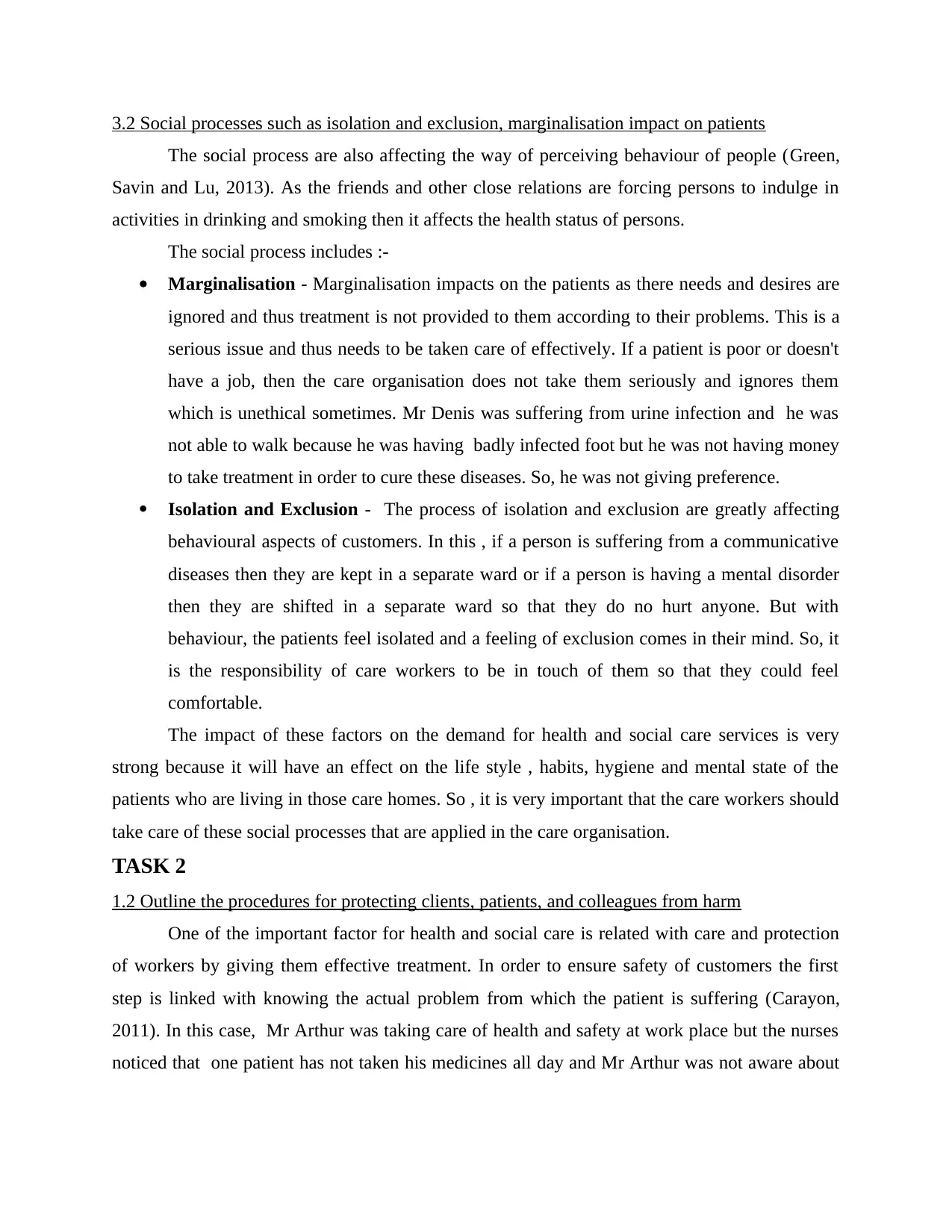
3.2 Social processes such as isolation and exclusion, marginalisation impact on patients
The social process are also affecting the way of perceiving behaviour of people (Green,
Savin and Lu, 2013). As the friends and other close relations are forcing persons to indulge in
activities in drinking and smoking then it affects the health status of persons.
The social process includes :-
Marginalisation - Marginalisation impacts on the patients as there needs and desires are
ignored and thus treatment is not provided to them according to their problems. This is a
serious issue and thus needs to be taken care of effectively. If a patient is poor or doesn't
have a job, then the care organisation does not take them seriously and ignores them
which is unethical sometimes. Mr Denis was suffering from urine infection and he was
not able to walk because he was having badly infected foot but he was not having money
to take treatment in order to cure these diseases. So, he was not giving preference.
Isolation and Exclusion - The process of isolation and exclusion are greatly affecting
behavioural aspects of customers. In this , if a person is suffering from a communicative
diseases then they are kept in a separate ward or if a person is having a mental disorder
then they are shifted in a separate ward so that they do no hurt anyone. But with
behaviour, the patients feel isolated and a feeling of exclusion comes in their mind. So, it
is the responsibility of care workers to be in touch of them so that they could feel
comfortable.
The impact of these factors on the demand for health and social care services is very
strong because it will have an effect on the life style , habits, hygiene and mental state of the
patients who are living in those care homes. So , it is very important that the care workers should
take care of these social processes that are applied in the care organisation.
TASK 2
1.2 Outline the procedures for protecting clients, patients, and colleagues from harm
One of the important factor for health and social care is related with care and protection
of workers by giving them effective treatment. In order to ensure safety of customers the first
step is linked with knowing the actual problem from which the patient is suffering (Carayon,
2011). In this case, Mr Arthur was taking care of health and safety at work place but the nurses
noticed that one patient has not taken his medicines all day and Mr Arthur was not aware about
The social process are also affecting the way of perceiving behaviour of people (Green,
Savin and Lu, 2013). As the friends and other close relations are forcing persons to indulge in
activities in drinking and smoking then it affects the health status of persons.
The social process includes :-
Marginalisation - Marginalisation impacts on the patients as there needs and desires are
ignored and thus treatment is not provided to them according to their problems. This is a
serious issue and thus needs to be taken care of effectively. If a patient is poor or doesn't
have a job, then the care organisation does not take them seriously and ignores them
which is unethical sometimes. Mr Denis was suffering from urine infection and he was
not able to walk because he was having badly infected foot but he was not having money
to take treatment in order to cure these diseases. So, he was not giving preference.
Isolation and Exclusion - The process of isolation and exclusion are greatly affecting
behavioural aspects of customers. In this , if a person is suffering from a communicative
diseases then they are kept in a separate ward or if a person is having a mental disorder
then they are shifted in a separate ward so that they do no hurt anyone. But with
behaviour, the patients feel isolated and a feeling of exclusion comes in their mind. So, it
is the responsibility of care workers to be in touch of them so that they could feel
comfortable.
The impact of these factors on the demand for health and social care services is very
strong because it will have an effect on the life style , habits, hygiene and mental state of the
patients who are living in those care homes. So , it is very important that the care workers should
take care of these social processes that are applied in the care organisation.
TASK 2
1.2 Outline the procedures for protecting clients, patients, and colleagues from harm
One of the important factor for health and social care is related with care and protection
of workers by giving them effective treatment. In order to ensure safety of customers the first
step is linked with knowing the actual problem from which the patient is suffering (Carayon,
2011). In this case, Mr Arthur was taking care of health and safety at work place but the nurses
noticed that one patient has not taken his medicines all day and Mr Arthur was not aware about
⊘ This is a preview!⊘
Do you want full access?
Subscribe today to unlock all pages.

Trusted by 1+ million students worldwide
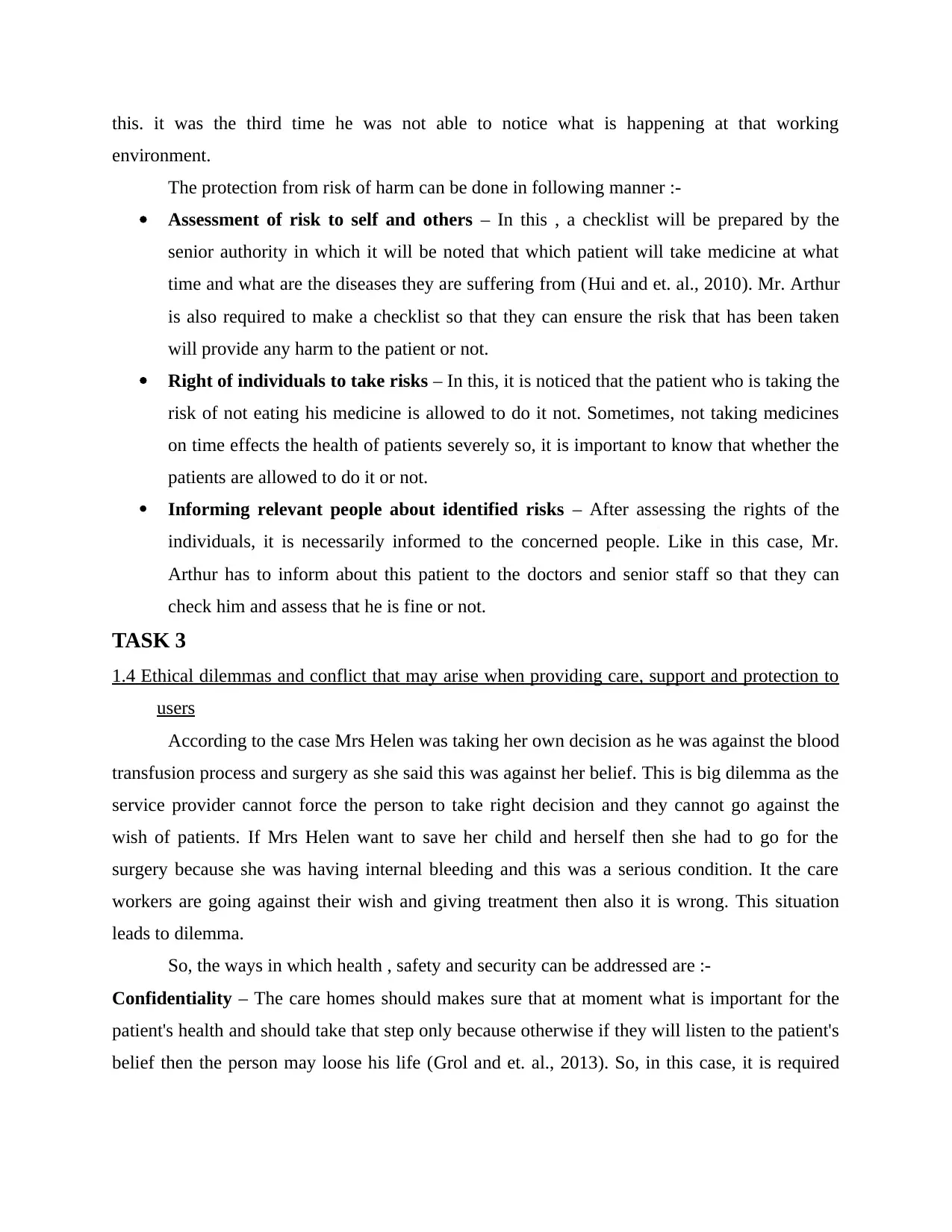
this. it was the third time he was not able to notice what is happening at that working
environment.
The protection from risk of harm can be done in following manner :-
Assessment of risk to self and others – In this , a checklist will be prepared by the
senior authority in which it will be noted that which patient will take medicine at what
time and what are the diseases they are suffering from (Hui and et. al., 2010). Mr. Arthur
is also required to make a checklist so that they can ensure the risk that has been taken
will provide any harm to the patient or not.
Right of individuals to take risks – In this, it is noticed that the patient who is taking the
risk of not eating his medicine is allowed to do it not. Sometimes, not taking medicines
on time effects the health of patients severely so, it is important to know that whether the
patients are allowed to do it or not.
Informing relevant people about identified risks – After assessing the rights of the
individuals, it is necessarily informed to the concerned people. Like in this case, Mr.
Arthur has to inform about this patient to the doctors and senior staff so that they can
check him and assess that he is fine or not.
TASK 3
1.4 Ethical dilemmas and conflict that may arise when providing care, support and protection to
users
According to the case Mrs Helen was taking her own decision as he was against the blood
transfusion process and surgery as she said this was against her belief. This is big dilemma as the
service provider cannot force the person to take right decision and they cannot go against the
wish of patients. If Mrs Helen want to save her child and herself then she had to go for the
surgery because she was having internal bleeding and this was a serious condition. It the care
workers are going against their wish and giving treatment then also it is wrong. This situation
leads to dilemma.
So, the ways in which health , safety and security can be addressed are :-
Confidentiality – The care homes should makes sure that at moment what is important for the
patient's health and should take that step only because otherwise if they will listen to the patient's
belief then the person may loose his life (Grol and et. al., 2013). So, in this case, it is required
environment.
The protection from risk of harm can be done in following manner :-
Assessment of risk to self and others – In this , a checklist will be prepared by the
senior authority in which it will be noted that which patient will take medicine at what
time and what are the diseases they are suffering from (Hui and et. al., 2010). Mr. Arthur
is also required to make a checklist so that they can ensure the risk that has been taken
will provide any harm to the patient or not.
Right of individuals to take risks – In this, it is noticed that the patient who is taking the
risk of not eating his medicine is allowed to do it not. Sometimes, not taking medicines
on time effects the health of patients severely so, it is important to know that whether the
patients are allowed to do it or not.
Informing relevant people about identified risks – After assessing the rights of the
individuals, it is necessarily informed to the concerned people. Like in this case, Mr.
Arthur has to inform about this patient to the doctors and senior staff so that they can
check him and assess that he is fine or not.
TASK 3
1.4 Ethical dilemmas and conflict that may arise when providing care, support and protection to
users
According to the case Mrs Helen was taking her own decision as he was against the blood
transfusion process and surgery as she said this was against her belief. This is big dilemma as the
service provider cannot force the person to take right decision and they cannot go against the
wish of patients. If Mrs Helen want to save her child and herself then she had to go for the
surgery because she was having internal bleeding and this was a serious condition. It the care
workers are going against their wish and giving treatment then also it is wrong. This situation
leads to dilemma.
So, the ways in which health , safety and security can be addressed are :-
Confidentiality – The care homes should makes sure that at moment what is important for the
patient's health and should take that step only because otherwise if they will listen to the patient's
belief then the person may loose his life (Grol and et. al., 2013). So, in this case, it is required
Paraphrase This Document
Need a fresh take? Get an instant paraphrase of this document with our AI Paraphraser
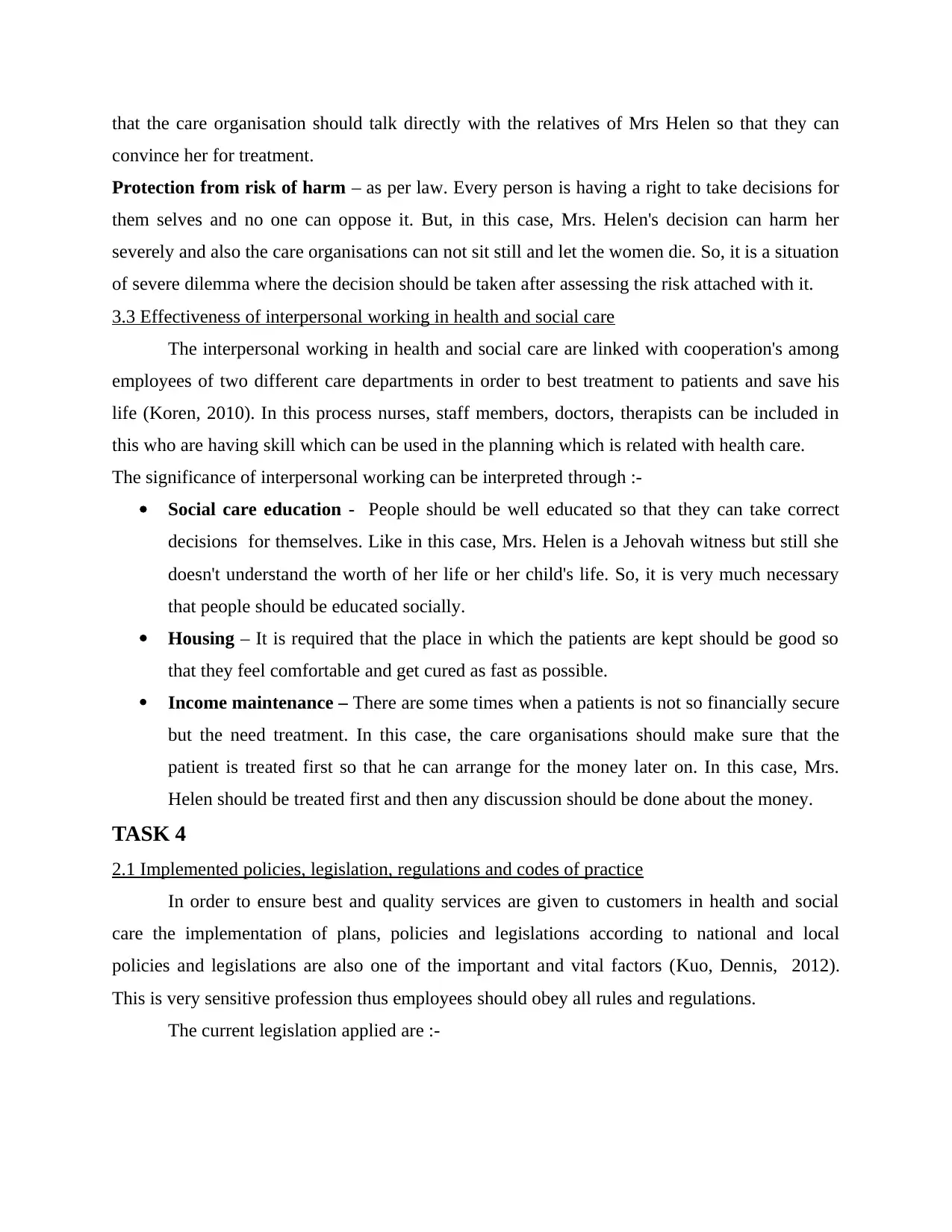
that the care organisation should talk directly with the relatives of Mrs Helen so that they can
convince her for treatment.
Protection from risk of harm – as per law. Every person is having a right to take decisions for
them selves and no one can oppose it. But, in this case, Mrs. Helen's decision can harm her
severely and also the care organisations can not sit still and let the women die. So, it is a situation
of severe dilemma where the decision should be taken after assessing the risk attached with it.
3.3 Effectiveness of interpersonal working in health and social care
The interpersonal working in health and social care are linked with cooperation's among
employees of two different care departments in order to best treatment to patients and save his
life (Koren, 2010). In this process nurses, staff members, doctors, therapists can be included in
this who are having skill which can be used in the planning which is related with health care.
The significance of interpersonal working can be interpreted through :-
Social care education - People should be well educated so that they can take correct
decisions for themselves. Like in this case, Mrs. Helen is a Jehovah witness but still she
doesn't understand the worth of her life or her child's life. So, it is very much necessary
that people should be educated socially.
Housing – It is required that the place in which the patients are kept should be good so
that they feel comfortable and get cured as fast as possible.
Income maintenance – There are some times when a patients is not so financially secure
but the need treatment. In this case, the care organisations should make sure that the
patient is treated first so that he can arrange for the money later on. In this case, Mrs.
Helen should be treated first and then any discussion should be done about the money.
TASK 4
2.1 Implemented policies, legislation, regulations and codes of practice
In order to ensure best and quality services are given to customers in health and social
care the implementation of plans, policies and legislations according to national and local
policies and legislations are also one of the important and vital factors (Kuo, Dennis, 2012).
This is very sensitive profession thus employees should obey all rules and regulations.
The current legislation applied are :-
convince her for treatment.
Protection from risk of harm – as per law. Every person is having a right to take decisions for
them selves and no one can oppose it. But, in this case, Mrs. Helen's decision can harm her
severely and also the care organisations can not sit still and let the women die. So, it is a situation
of severe dilemma where the decision should be taken after assessing the risk attached with it.
3.3 Effectiveness of interpersonal working in health and social care
The interpersonal working in health and social care are linked with cooperation's among
employees of two different care departments in order to best treatment to patients and save his
life (Koren, 2010). In this process nurses, staff members, doctors, therapists can be included in
this who are having skill which can be used in the planning which is related with health care.
The significance of interpersonal working can be interpreted through :-
Social care education - People should be well educated so that they can take correct
decisions for themselves. Like in this case, Mrs. Helen is a Jehovah witness but still she
doesn't understand the worth of her life or her child's life. So, it is very much necessary
that people should be educated socially.
Housing – It is required that the place in which the patients are kept should be good so
that they feel comfortable and get cured as fast as possible.
Income maintenance – There are some times when a patients is not so financially secure
but the need treatment. In this case, the care organisations should make sure that the
patient is treated first so that he can arrange for the money later on. In this case, Mrs.
Helen should be treated first and then any discussion should be done about the money.
TASK 4
2.1 Implemented policies, legislation, regulations and codes of practice
In order to ensure best and quality services are given to customers in health and social
care the implementation of plans, policies and legislations according to national and local
policies and legislations are also one of the important and vital factors (Kuo, Dennis, 2012).
This is very sensitive profession thus employees should obey all rules and regulations.
The current legislation applied are :-
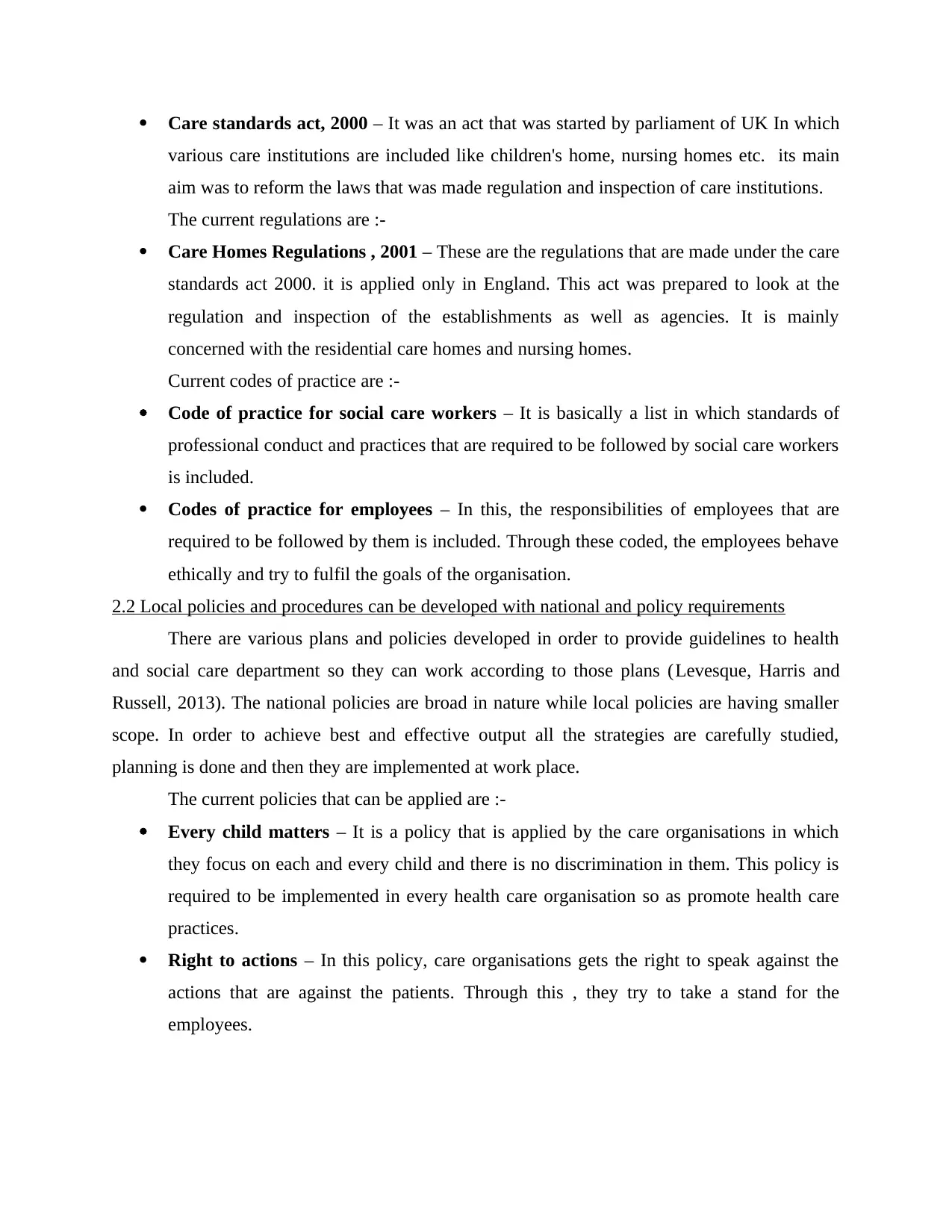
Care standards act, 2000 – It was an act that was started by parliament of UK In which
various care institutions are included like children's home, nursing homes etc. its main
aim was to reform the laws that was made regulation and inspection of care institutions.
The current regulations are :-
Care Homes Regulations , 2001 – These are the regulations that are made under the care
standards act 2000. it is applied only in England. This act was prepared to look at the
regulation and inspection of the establishments as well as agencies. It is mainly
concerned with the residential care homes and nursing homes.
Current codes of practice are :-
Code of practice for social care workers – It is basically a list in which standards of
professional conduct and practices that are required to be followed by social care workers
is included.
Codes of practice for employees – In this, the responsibilities of employees that are
required to be followed by them is included. Through these coded, the employees behave
ethically and try to fulfil the goals of the organisation.
2.2 Local policies and procedures can be developed with national and policy requirements
There are various plans and policies developed in order to provide guidelines to health
and social care department so they can work according to those plans (Levesque, Harris and
Russell, 2013). The national policies are broad in nature while local policies are having smaller
scope. In order to achieve best and effective output all the strategies are carefully studied,
planning is done and then they are implemented at work place.
The current policies that can be applied are :-
Every child matters – It is a policy that is applied by the care organisations in which
they focus on each and every child and there is no discrimination in them. This policy is
required to be implemented in every health care organisation so as promote health care
practices.
Right to actions – In this policy, care organisations gets the right to speak against the
actions that are against the patients. Through this , they try to take a stand for the
employees.
various care institutions are included like children's home, nursing homes etc. its main
aim was to reform the laws that was made regulation and inspection of care institutions.
The current regulations are :-
Care Homes Regulations , 2001 – These are the regulations that are made under the care
standards act 2000. it is applied only in England. This act was prepared to look at the
regulation and inspection of the establishments as well as agencies. It is mainly
concerned with the residential care homes and nursing homes.
Current codes of practice are :-
Code of practice for social care workers – It is basically a list in which standards of
professional conduct and practices that are required to be followed by social care workers
is included.
Codes of practice for employees – In this, the responsibilities of employees that are
required to be followed by them is included. Through these coded, the employees behave
ethically and try to fulfil the goals of the organisation.
2.2 Local policies and procedures can be developed with national and policy requirements
There are various plans and policies developed in order to provide guidelines to health
and social care department so they can work according to those plans (Levesque, Harris and
Russell, 2013). The national policies are broad in nature while local policies are having smaller
scope. In order to achieve best and effective output all the strategies are carefully studied,
planning is done and then they are implemented at work place.
The current policies that can be applied are :-
Every child matters – It is a policy that is applied by the care organisations in which
they focus on each and every child and there is no discrimination in them. This policy is
required to be implemented in every health care organisation so as promote health care
practices.
Right to actions – In this policy, care organisations gets the right to speak against the
actions that are against the patients. Through this , they try to take a stand for the
employees.
⊘ This is a preview!⊘
Do you want full access?
Subscribe today to unlock all pages.

Trusted by 1+ million students worldwide
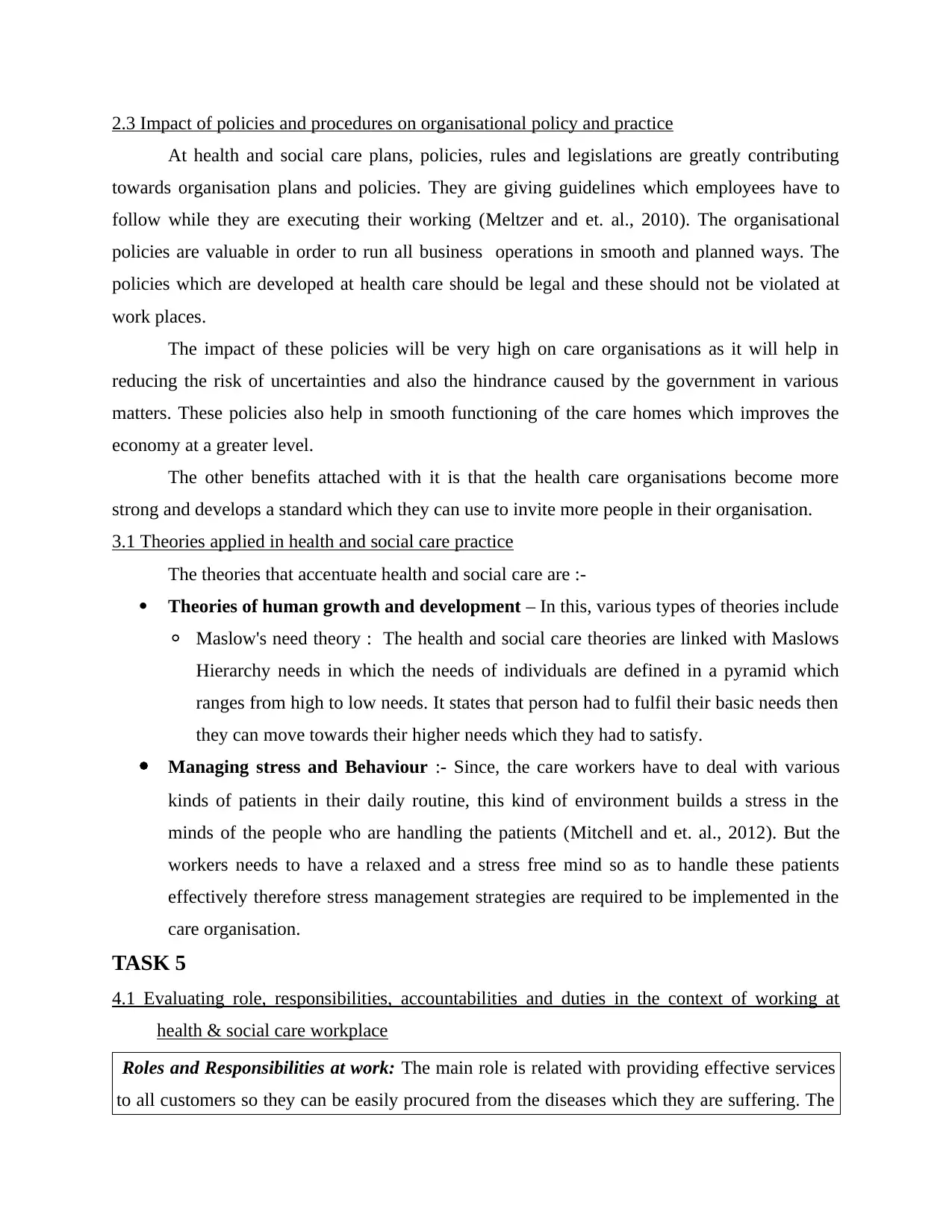
2.3 Impact of policies and procedures on organisational policy and practice
At health and social care plans, policies, rules and legislations are greatly contributing
towards organisation plans and policies. They are giving guidelines which employees have to
follow while they are executing their working (Meltzer and et. al., 2010). The organisational
policies are valuable in order to run all business operations in smooth and planned ways. The
policies which are developed at health care should be legal and these should not be violated at
work places.
The impact of these policies will be very high on care organisations as it will help in
reducing the risk of uncertainties and also the hindrance caused by the government in various
matters. These policies also help in smooth functioning of the care homes which improves the
economy at a greater level.
The other benefits attached with it is that the health care organisations become more
strong and develops a standard which they can use to invite more people in their organisation.
3.1 Theories applied in health and social care practice
The theories that accentuate health and social care are :-
Theories of human growth and development – In this, various types of theories include
◦ Maslow's need theory : The health and social care theories are linked with Maslows
Hierarchy needs in which the needs of individuals are defined in a pyramid which
ranges from high to low needs. It states that person had to fulfil their basic needs then
they can move towards their higher needs which they had to satisfy.
Managing stress and Behaviour :- Since, the care workers have to deal with various
kinds of patients in their daily routine, this kind of environment builds a stress in the
minds of the people who are handling the patients (Mitchell and et. al., 2012). But the
workers needs to have a relaxed and a stress free mind so as to handle these patients
effectively therefore stress management strategies are required to be implemented in the
care organisation.
TASK 5
4.1 Evaluating role, responsibilities, accountabilities and duties in the context of working at
health & social care workplace
Roles and Responsibilities at work: The main role is related with providing effective services
to all customers so they can be easily procured from the diseases which they are suffering. The
At health and social care plans, policies, rules and legislations are greatly contributing
towards organisation plans and policies. They are giving guidelines which employees have to
follow while they are executing their working (Meltzer and et. al., 2010). The organisational
policies are valuable in order to run all business operations in smooth and planned ways. The
policies which are developed at health care should be legal and these should not be violated at
work places.
The impact of these policies will be very high on care organisations as it will help in
reducing the risk of uncertainties and also the hindrance caused by the government in various
matters. These policies also help in smooth functioning of the care homes which improves the
economy at a greater level.
The other benefits attached with it is that the health care organisations become more
strong and develops a standard which they can use to invite more people in their organisation.
3.1 Theories applied in health and social care practice
The theories that accentuate health and social care are :-
Theories of human growth and development – In this, various types of theories include
◦ Maslow's need theory : The health and social care theories are linked with Maslows
Hierarchy needs in which the needs of individuals are defined in a pyramid which
ranges from high to low needs. It states that person had to fulfil their basic needs then
they can move towards their higher needs which they had to satisfy.
Managing stress and Behaviour :- Since, the care workers have to deal with various
kinds of patients in their daily routine, this kind of environment builds a stress in the
minds of the people who are handling the patients (Mitchell and et. al., 2012). But the
workers needs to have a relaxed and a stress free mind so as to handle these patients
effectively therefore stress management strategies are required to be implemented in the
care organisation.
TASK 5
4.1 Evaluating role, responsibilities, accountabilities and duties in the context of working at
health & social care workplace
Roles and Responsibilities at work: The main role is related with providing effective services
to all customers so they can be easily procured from the diseases which they are suffering. The
Paraphrase This Document
Need a fresh take? Get an instant paraphrase of this document with our AI Paraphraser
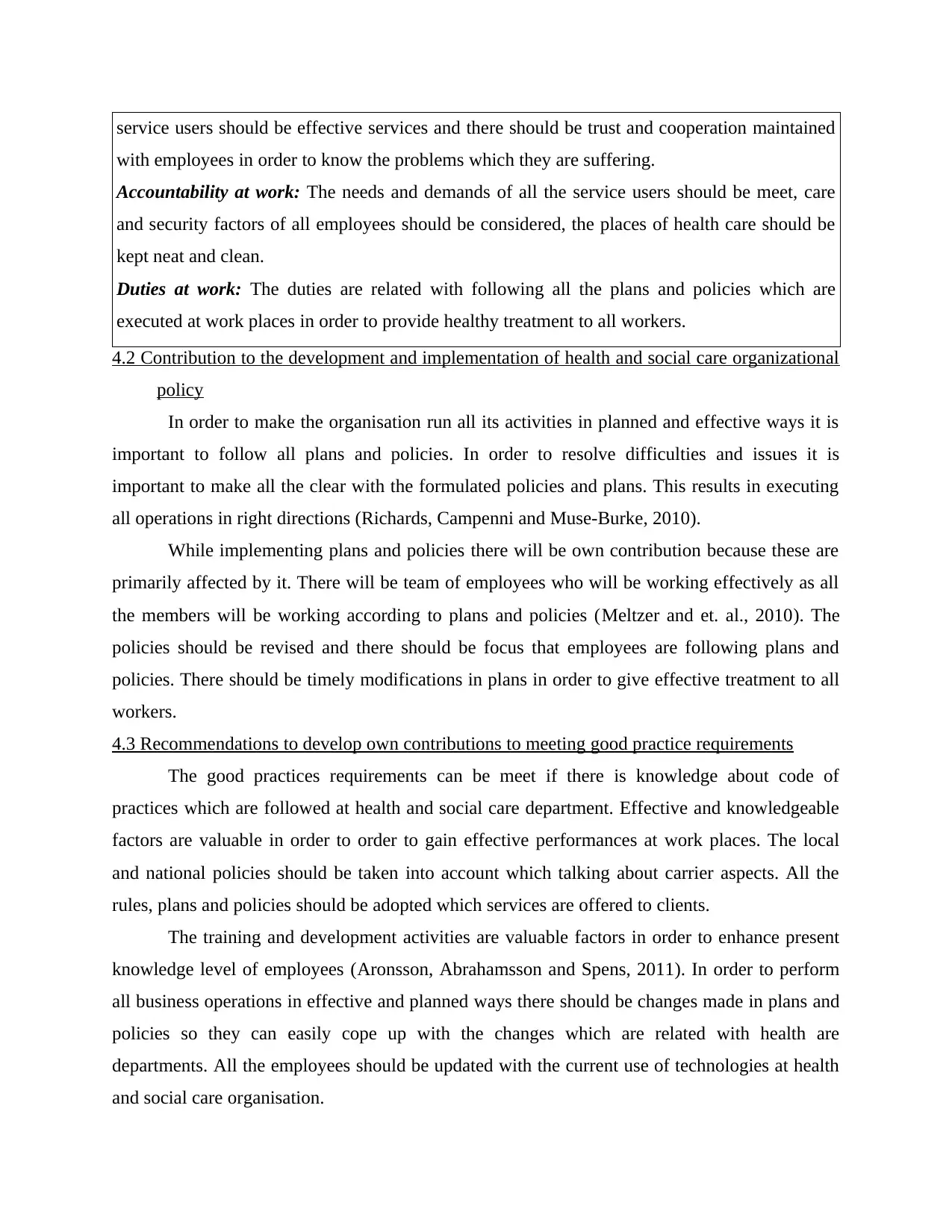
service users should be effective services and there should be trust and cooperation maintained
with employees in order to know the problems which they are suffering.
Accountability at work: The needs and demands of all the service users should be meet, care
and security factors of all employees should be considered, the places of health care should be
kept neat and clean.
Duties at work: The duties are related with following all the plans and policies which are
executed at work places in order to provide healthy treatment to all workers.
4.2 Contribution to the development and implementation of health and social care organizational
policy
In order to make the organisation run all its activities in planned and effective ways it is
important to follow all plans and policies. In order to resolve difficulties and issues it is
important to make all the clear with the formulated policies and plans. This results in executing
all operations in right directions (Richards, Campenni and Muse-Burke, 2010).
While implementing plans and policies there will be own contribution because these are
primarily affected by it. There will be team of employees who will be working effectively as all
the members will be working according to plans and policies (Meltzer and et. al., 2010). The
policies should be revised and there should be focus that employees are following plans and
policies. There should be timely modifications in plans in order to give effective treatment to all
workers.
4.3 Recommendations to develop own contributions to meeting good practice requirements
The good practices requirements can be meet if there is knowledge about code of
practices which are followed at health and social care department. Effective and knowledgeable
factors are valuable in order to order to gain effective performances at work places. The local
and national policies should be taken into account which talking about carrier aspects. All the
rules, plans and policies should be adopted which services are offered to clients.
The training and development activities are valuable factors in order to enhance present
knowledge level of employees (Aronsson, Abrahamsson and Spens, 2011). In order to perform
all business operations in effective and planned ways there should be changes made in plans and
policies so they can easily cope up with the changes which are related with health are
departments. All the employees should be updated with the current use of technologies at health
and social care organisation.
with employees in order to know the problems which they are suffering.
Accountability at work: The needs and demands of all the service users should be meet, care
and security factors of all employees should be considered, the places of health care should be
kept neat and clean.
Duties at work: The duties are related with following all the plans and policies which are
executed at work places in order to provide healthy treatment to all workers.
4.2 Contribution to the development and implementation of health and social care organizational
policy
In order to make the organisation run all its activities in planned and effective ways it is
important to follow all plans and policies. In order to resolve difficulties and issues it is
important to make all the clear with the formulated policies and plans. This results in executing
all operations in right directions (Richards, Campenni and Muse-Burke, 2010).
While implementing plans and policies there will be own contribution because these are
primarily affected by it. There will be team of employees who will be working effectively as all
the members will be working according to plans and policies (Meltzer and et. al., 2010). The
policies should be revised and there should be focus that employees are following plans and
policies. There should be timely modifications in plans in order to give effective treatment to all
workers.
4.3 Recommendations to develop own contributions to meeting good practice requirements
The good practices requirements can be meet if there is knowledge about code of
practices which are followed at health and social care department. Effective and knowledgeable
factors are valuable in order to order to gain effective performances at work places. The local
and national policies should be taken into account which talking about carrier aspects. All the
rules, plans and policies should be adopted which services are offered to clients.
The training and development activities are valuable factors in order to enhance present
knowledge level of employees (Aronsson, Abrahamsson and Spens, 2011). In order to perform
all business operations in effective and planned ways there should be changes made in plans and
policies so they can easily cope up with the changes which are related with health are
departments. All the employees should be updated with the current use of technologies at health
and social care organisation.
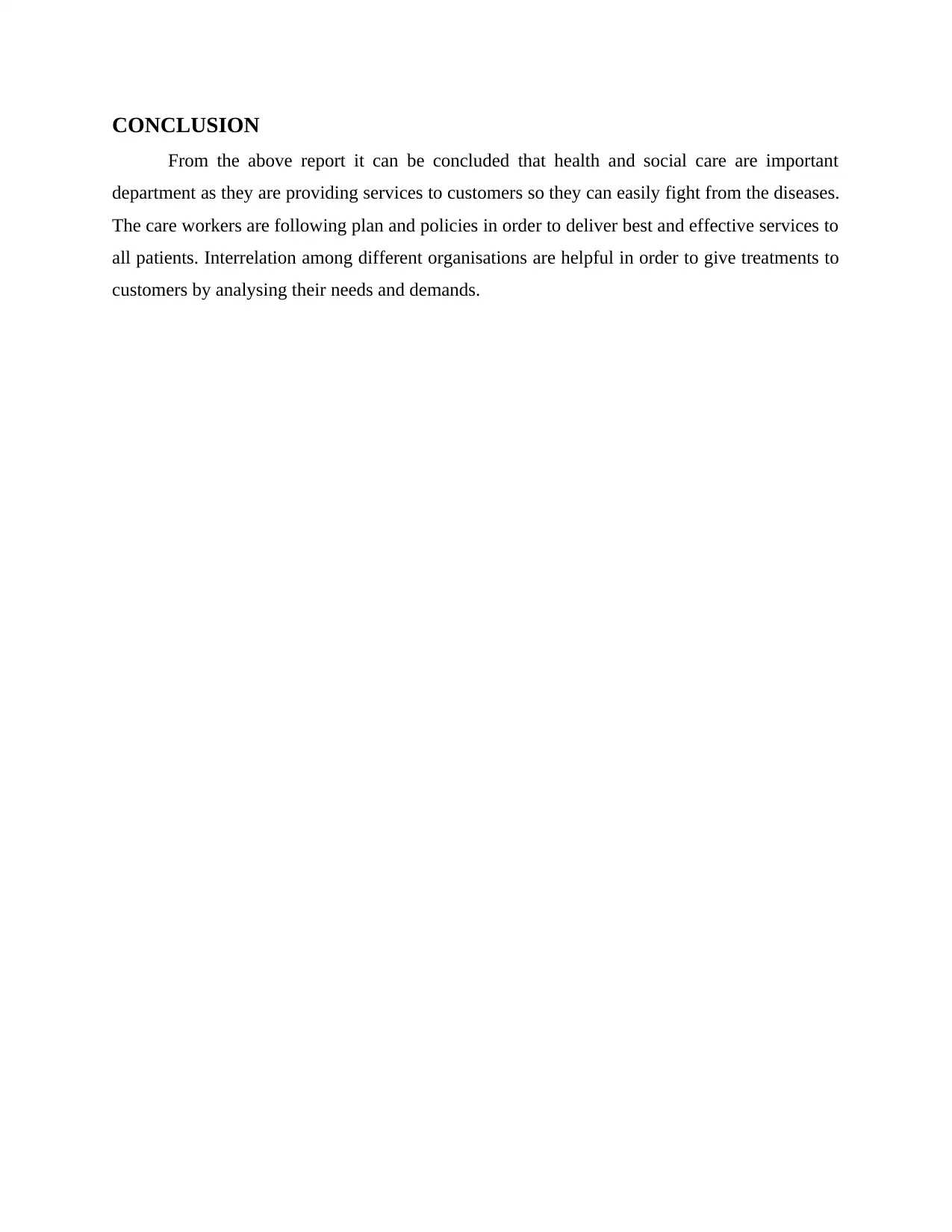
CONCLUSION
From the above report it can be concluded that health and social care are important
department as they are providing services to customers so they can easily fight from the diseases.
The care workers are following plan and policies in order to deliver best and effective services to
all patients. Interrelation among different organisations are helpful in order to give treatments to
customers by analysing their needs and demands.
From the above report it can be concluded that health and social care are important
department as they are providing services to customers so they can easily fight from the diseases.
The care workers are following plan and policies in order to deliver best and effective services to
all patients. Interrelation among different organisations are helpful in order to give treatments to
customers by analysing their needs and demands.
⊘ This is a preview!⊘
Do you want full access?
Subscribe today to unlock all pages.

Trusted by 1+ million students worldwide
1 out of 14
Related Documents
Your All-in-One AI-Powered Toolkit for Academic Success.
+13062052269
info@desklib.com
Available 24*7 on WhatsApp / Email
![[object Object]](/_next/static/media/star-bottom.7253800d.svg)
Unlock your academic potential
Copyright © 2020–2026 A2Z Services. All Rights Reserved. Developed and managed by ZUCOL.





